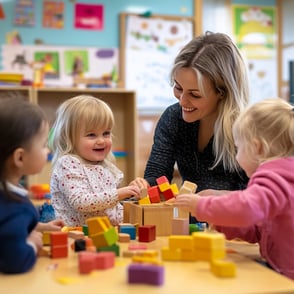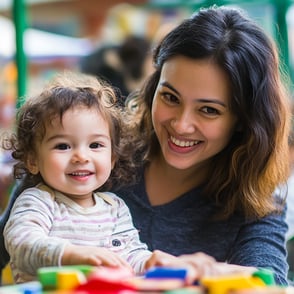Discover the essential qualifications and skills needed to become a successful childcare provider. Be you a nursery school, kindergarten, daycare center or childminder, you will still have to (or should) register with Ofsted, the UK's national education regulator, and adhere to the statutory requirements set out in the Early Years Foundation Stage Statutory Framework 2024 revisions, and Working Together to Safeguard Children; the Health & Safety Executives provisions for educational delivery
Understanding the Importance of Childcare Providers
Childcare providers play a crucial role in the development and well-being of children. They provide a safe and nurturing environment for children to learn, grow, and thrive. High-quality childcare providers understand the importance of early childhood education and the impact it has on a child's future. They recognize that the first few years of a child's life are critical for their cognitive, social, and emotional development. By providing a caring and stimulating environment, childcare providers contribute to the overall well-being of children and help them reach their full potential.
In addition to providing a safe and nurturing environment, childcare providers also serve as role models for young children. They teach important values such as kindness, respect, and empathy. They foster positive relationships and help children develop social skills that will benefit them throughout their lives. With their guidance and support, childcare providers help children build a strong foundation for future success.
Educational Requirements for Childcare Providers
To become a childcare provider, certain educational and compliance requirements set out from Ofsted, the UK national education regulator, must be met. There are stipulations not only on the number of staff you must employ against the numbers of children in the school, by age, but you have to also ensure that the correct qualifications and paediatric first aid training is secured in advance. You have spatial dynamics to consider that restrict the number of children, again by age, that you can have in any given play space. And you have the requirements to maintain accurate records relevant to the provision of care for the purposes of safeguarding. You can review the full requirement on the Ofsted website for the EYFS Statutory Framework
In addition to formal education, childcare providers often undergo specialized training in areas such as child health and safety, child development, and behavior management. This training equips them with the knowledge and skills necessary to provide high-quality care to children of different ages and backgrounds.
Continuing education is also important for childcare providers to stay updated on the latest research and best practices in early childhood education. By participating in professional development workshops and courses, they can enhance their skills and provide the best possible care for the children under their supervision.
Experience and Skills for Childcare Providers
While education is important, experience and skills are equally valuable for childcare providers. Hands-on experience working with children helps them understand their individual needs and develop effective strategies to support their growth and development. It allows childcare providers to become familiar with different age groups and learn how to adapt their approach accordingly.
In addition to experience, certain skills are essential for childcare providers to excel in their role. These skills include excellent communication and interpersonal skills, patience, creativity, problem-solving abilities, and the ability to work well under pressure. Childcare providers must be able to communicate effectively with children, parents, and colleagues, and maintain a positive and supportive environment for all involved.
Furthermore, childcare providers must be adaptable and flexible, as each child is unique and may require different approaches. They must be able to handle challenging situations with calmness and professionalism, and be proactive in identifying and addressing any issues that may arise.
Certifications and Licensing for Childcare Providers
In many countries, childcare providers are required to obtain certain certifications and licenses to ensure the safety and well-being of the children in their care. These certifications and licenses may vary depending on the country or state, but typically include first aid and CPR certification, background checks, and adherence to specific health and safety regulations.
Certifications such as the Child Development Associate (CDA) credential or a nationally recognized early childhood education qualification can also enhance the credibility and professionalism of childcare providers. These certifications demonstrate a commitment to ongoing professional development and a dedication to providing high-quality care to children.
Building Trust and Creating a Safe Environment
Building trust with both children and parents is essential for childcare providers. Parents need to feel confident that their child is in safe and capable hands, while children need to feel secure and comfortable in their childcare environment. To build trust, childcare providers must establish open and honest communication with parents, providing regular updates on their child's progress and addressing any concerns or questions they may have.
Creating a safe environment is also of utmost importance. Childcare providers must ensure that all safety measures are in place, such as childproofing the premises, maintaining cleanliness and hygiene, and implementing appropriate health and safety protocols. They must be vigilant and proactive in identifying and mitigating potential risks to ensure the well-being of the children.
Furthermore, childcare providers must create a warm and welcoming atmosphere where children feel valued and respected. By fostering positive relationships and providing individual attention, they can create a sense of belonging and security for the children in their care.
24-Jan-2024 14:44:33
Related Articles






Write a Comment